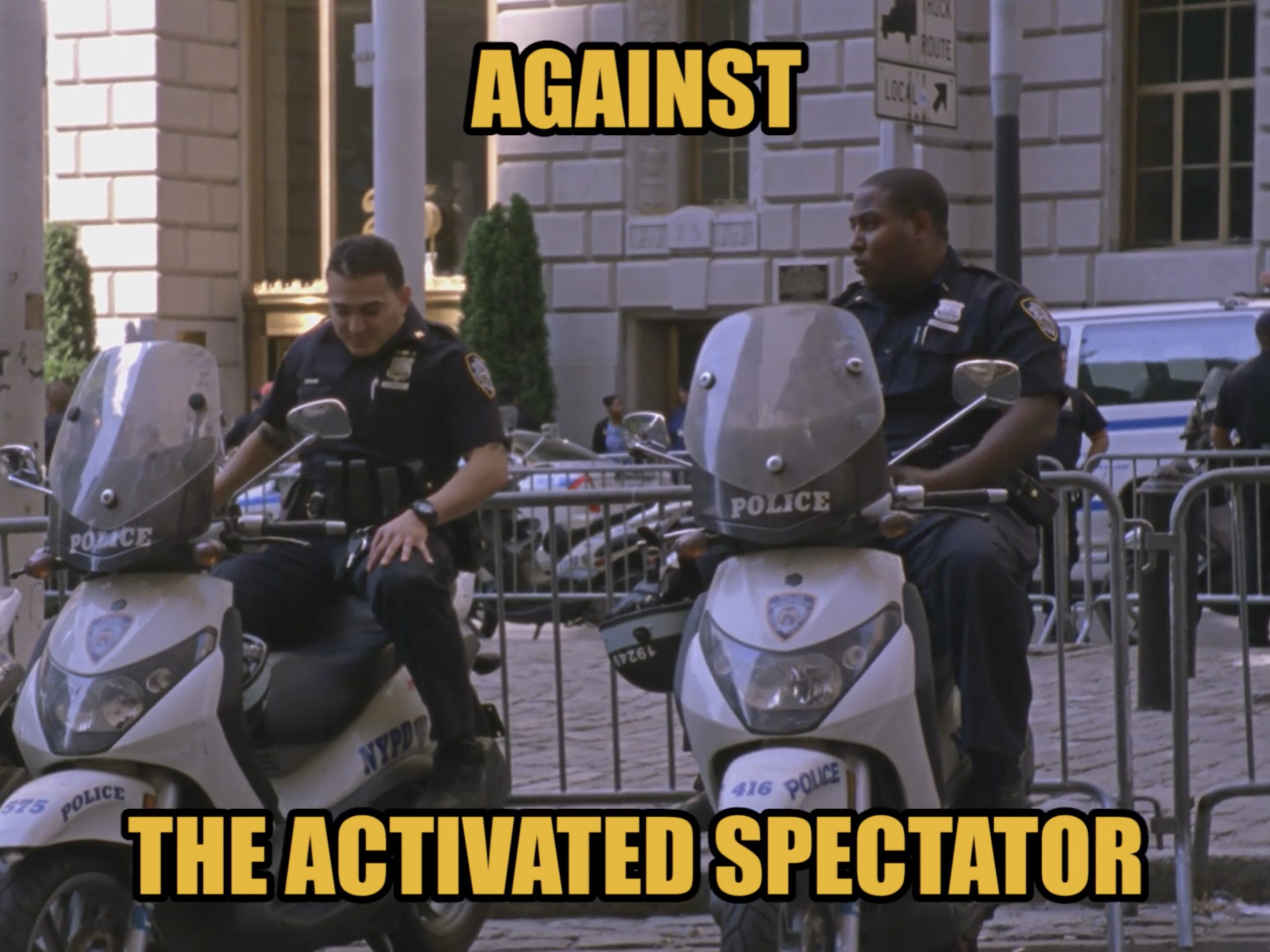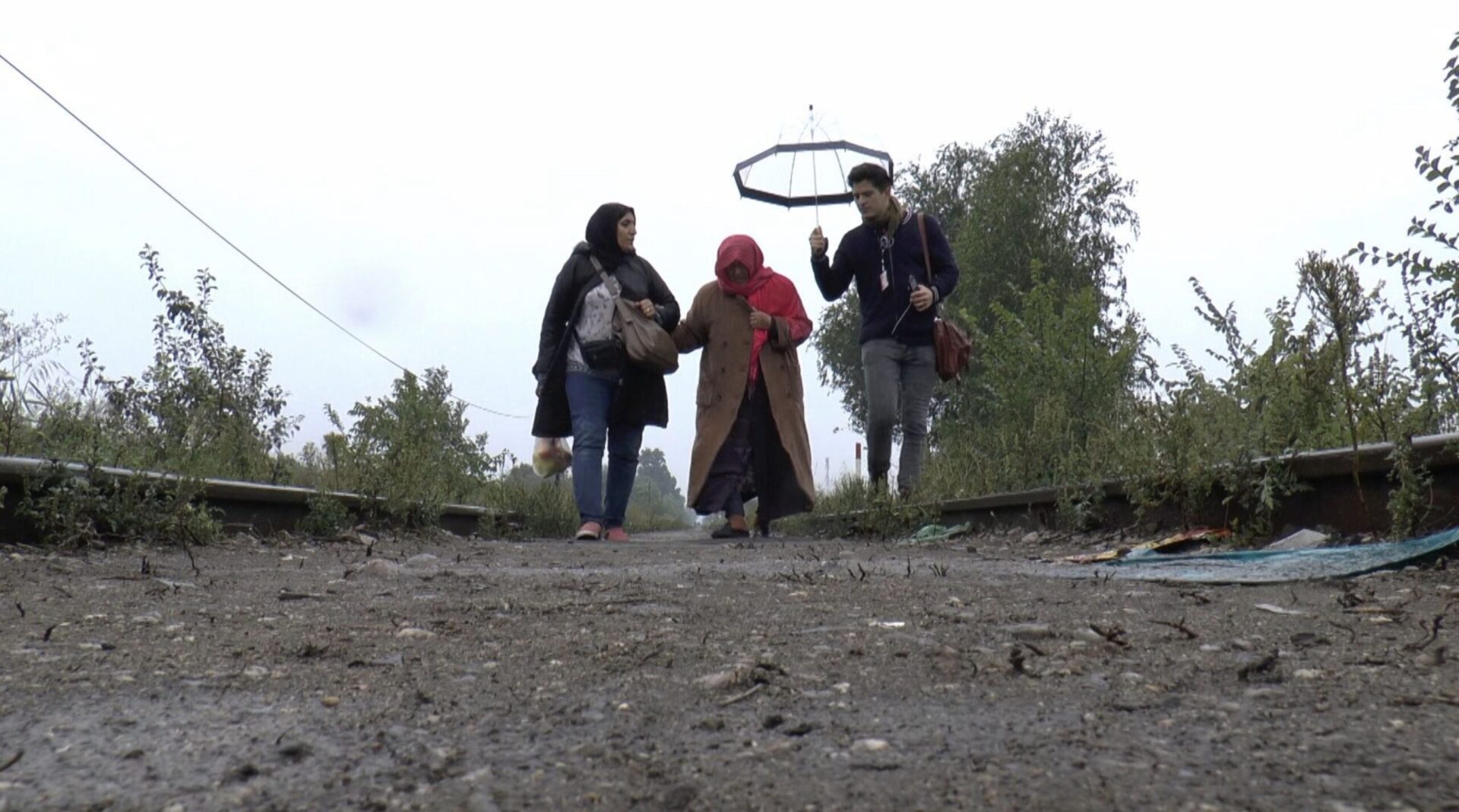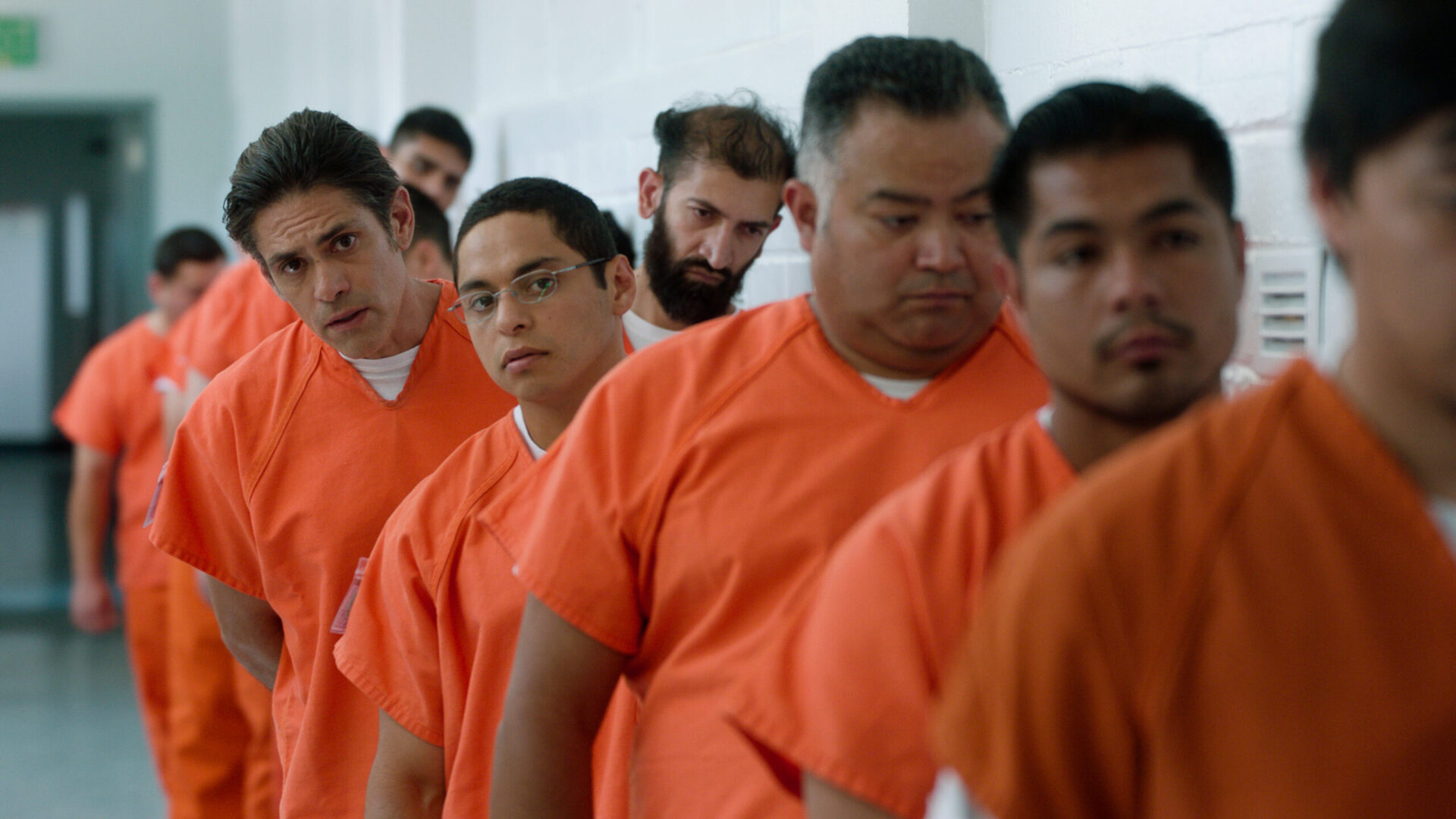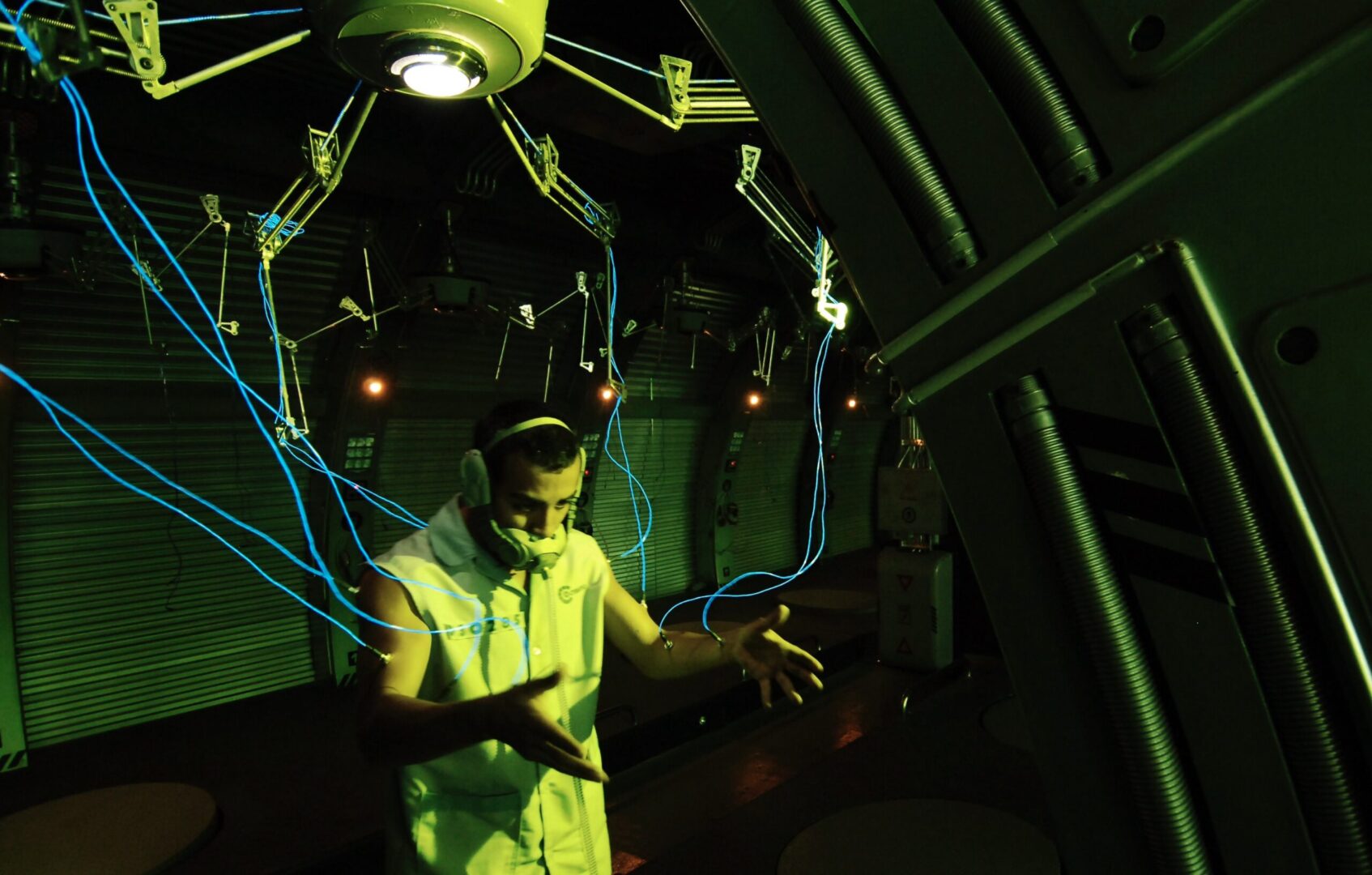
- This event has passed.
Rushes: Films and actions by Jason Livingston

Tuesday, May 7, 7 pm ET
@ Journey’s End Refugee Services (2495 Main St #530, Buffalo, NY 14214) and online
Free or suggested donation
Tickets available below
Squeaky Wheel presents an evening of films, actions, and conversation with artist Jason Livingston. This evening of films showcases Livingston’s long-standing work on the climate crises and protest movements through visual and linguistic play. Featuring his celebrated film Ancient Sunshine (2020), the screening features work made by the filmmaker from 2012 to the present day. This event is organized on the occasion of his exhibition with Phoebe A. Cohen, In the Sun’s Absence. The artist will be present to deliver an artist talk ahead of the screening, and the exhibition will be open after the screening at Squeaky Wheel.
For in-person attendees: JERS is located on the fifth floor of Tri-Main Center; head left after you exit the elevator. Please note that you cannot enter Tri-Main Center after 7:30 pm.
For online attendees: Upon check-out, you will receive an email titled “Your Squeaky Wheel Film & Media Art Center order has been received!”. A private link will be included in that email; the event will be available at the link at the start date and time. You will have access to the event for 24 hours; Squeaky Wheel members receive 72 hour access. Not a member yet? Sign up here. Please note that the artist talk will not be available online.
Total program time approximately 65 minutes.
Introduction and artist talk by Jason Livingston
#RUSHES/URL
11:52 min, silent, 16mm on digital video, 2015
An in-camera 16mm edit of the 1st anniversary/birthday/funeral of OWS in New York City, as seen from an embedded role in the Jellyfish Brigade, an ad hoc affinity group formed to participate in the day’s event. Bold impact fonts compliment and countervail the images toward a warm antagonism.
“Experimental filmmakers with no obligation to spoon feed the public fared better in documenting Occupy in a manner that proved more meditative and avoided reducing the movement to a list of talking points. Jason Livingston’s short film, #Rushes, provides an alternative to what the filmmaker himself labels “populist agitprop.” The two versions of the film deploy contrasting reflexive strategies designed to challenge standard representations of dissent and on-the-spot reportage of street activism. Offering a glimpse of a festive protest cum celebration commemorating the first anniversary of Occupy Wall Street in 2012, Livingston juxtaposes the culture-jamming antics of the Jellyfish Brigade with familiar scenes of police intimidation and use of force. Demonstrators dressed in whimsical costumes holding signs such as “No Fossil Fuels…Frack Wall Street, Not Water” highlight the march’s blend of earnestness and carnivalesque glee; the differences in tone are reinforced by, on the one hand, the satirist Reverend Billy’s comic spiel and, on the other, the unironic politicking of perennial presidential candidate Jill Stein and Cheri Honkala, her 2012 vice-presidential candidate.
Forsaking digital for 16mm with in-camera edits, the initial version of #Rushes was projected silently to live audiences. Refusing to bombard the audience with riot porn clichés, talking heads, voice over—or even the ambient sounds of a demonstration—Livingston instead solicited a running commentary from the audience at various screenings and encourage a participatory ethic and aesthetic. His decision to shoot in 16mm and move away from the more au courant DSLR aesthetic evolved from his revulsion towards consumerist pressure to abandon “technologies deemed obsolescent.”
Although Livingston’s regarded his stripped-down aesthetic—and his promotion of audience participation—as “Occupy poetics,” a screening at Union Docs in Brooklyn convinced him to launch an extended auto-critique of his own neo-Brechtian assumptions concerning “active spectatorship.” Despite the fact that #Rushes inspired some impassioned responses from audiences (particularly a frenetic screening at Squeaky Wheel in Buffalo which Livingston loved because it engendered a “lot of talking” over the silent images), he feared “that by encouraging ‘participation’ (i.e. talking) without sufficient direction on my part, I was inadvertently disavowing my role as the maker (not that it’s much power in the end…), and actually promoting a very, very vague participatory democracy that felt all too much like upper management’s penchant for doodlepolls, or asking workers for ‘input’.”
Livingston’s ambivalence towards his own attempt to emulate Occupy-style egalitarianism one microcinema at a time convinced him to accompany the film with narration, later transformed into a series of memes embedded in a second version of the film, that undercuts the celebration of a participatory ethos with what he terms a “warm antagonism.” Warm antagonism might be defined as playful self-laceration, almost a parody of the type of self-criticism that was once de rigueur among authoritarian leftists. In the self-détourned version of #Rushes, Livingston proclaims:: “Against participation, not because participation denies the primary role of the artist in any given work and thus projects an anti-hierarchical fantasy…but because participation itself is a bureaucratic imagination.” While there’s a tongue-in-cheek aspect to Livingston’s self-indictment, the cadences of his manifesto also undermine the pieties of “active spectatorship” and the hallowed entity known as the “emancipated spectator.” In certain respects, the alternative film world’s penchant for participatory events might constitute a farcical equivalent of the pseudo-participation that anarchists discerned as integral components of Yugoslavian experiments in self-management. From another perspective, the film’s dialogue with its audience, and with itself, is close to the kind of “auto-ethnography” that David Graeber proposes as a riposte to the vanguardist sensibility.” – Richard Porton, author of Film and the Anarchist Imagination, 2nd edition
7.24.14
4.5 mins, silent, 16mm film on digital video, 2014
Demonstration in support of Gaza and against Operation Protective Edge on July 24, 2014 in Ithaca, NY.
Shale Raga
4.5 min, sound, digital video, 2015
Set to an excerpt of Don Cherry’s Malkauns from his border-erasing 1975 album, Brown Rice, Shale Raga extracts a mining industry in-house video to put pressure on carbon-based capitalist sorcery, in this case EcoShale technology, which is patented by Alberta-based Red Leaf Resources, Inc. and promises to “revolutionize” oil shale production in the Book Cliffs of eastern Utah by accelerating geological time. The video is a counter-spell to ward off venture capital’s appetite for ancient life forms baked into rock.
ACID REIGN
4.5 min, sound, digital video, 2012
Combining archival/found footage, treated images and diaristic Hi-8 video, ACID REIGN explores the ongoing battle between human beings’ technologies of control and other life forms. In this case, animals re-inhabit a post-human urban landscape.
Ancient Sunshine
19.5 mins, sound, 16mm film on digital video, 2021
A fossil cast in plastic, an artificial plateau, classic cars running on the fumes of the nation. Ancient Sunshine marks a path through fossil fuel extraction and climate defense in the American West. The film proposes solidarity against the violence by which “earth” becomes “resource.”
Utah Tar Sands Resistance has been fighting experimental mining in the Tavaputs Plateau for almost a decade, setting up camp every summer in sight of heavy equipment and construction crews. The film asks, how might the concept of horizontalism be applied to the physical horizon, its decimation, and to capital’s propensity for vertical extrication? Ancient Sunshine interweaves the endless remaking of the Western landscape with labor history, reflections on anarchist organization, and interspecies economies.
Ancient Sunshine consists of interviews with the Utah Tar Sands Resistance primary organizers and other Utah land protectors, and sets their voices in and against an industrialized landscape. The film presents an array of voices, drawing attention to the role of resistance and kinship during times of threat and extinction.
Toward a poetic solidarity, toward a formal politics.
Biography of the artist
Jason Livingston is a media artist, filmmaker, and educator. His award-winning films have been widely exhibited at festivals and museums, including the National Gallery of Art in Washington, D.C., the International Film Festival Rotterdam, and Media City in Canada. He is currently researching histories of extractive cinema and abolitionist re-imaginings of our shared world as a Presidential Fellow in the Department of Media Study, University at Buffalo.




